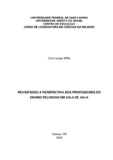| dc.contributor.advisor | Marquezan, Lorena Ines Peterini | |
| dc.creator | Wille, Lino Lange | |
| dc.date.accessioned | 2021-03-03T17:31:49Z | |
| dc.date.available | 2021-03-03T17:31:49Z | |
| dc.date.issued | 2020-12-15 | |
| dc.date.submitted | 2020 | |
| dc.identifier.uri | http://repositorio.ufsm.br/handle/1/20371 | |
| dc.description | Trabalho de conclusão de curso (graduação) - Universidade Federal de Santa Maria, Centro de Educação, RS, 2021 | por |
| dc.description.abstract | When we go on a four-year journey in search of knowledge and answers, we perceive an ontological inquiry in our living, we find it again at the dawn of this Degree in Sciences of Religion and once again it is in front of us in a recurring way: “Men they know little about themselves, ... they ask, they answer and their answers lead them to new questions. ” (1) (FREIRE, 2019, p.39). We are not exactly concerned with the regulation and normatization of schooling for Religious Education in public and denominational schools, this is also important and open to questioning. In fact, the ideological clash over the treatment of the religious aspect in schooling has followed the educational history of our country. Our concern was the dialectic established between the human being teacher and his holistic view of the religious world and his becoming to live in a peaceful and pacifying way with the religious otherness that makes up his universe of work. What is the burden that involves the ability to be open to dialogicity in a field as intimate as personal faith in the multi-religious school environment without falsehood, negationism or catechetical cooptation? How to reconcile: “Religious Education through professionals who work in this area no longer with theological assumptions, but with pedagogical assumptions” (2) (JUNQUEIRA, 2002, p. 43. We aim to revisit the perspective of religious education teachers in the classroom We conclude that the religion that can be considered as flowing from the sources of "religare", reconnect with the transcendent. | eng |
| dc.language | por | por |
| dc.publisher | Universidade Federal de Santa Maria | por |
| dc.rights | Acesso Aberto | por |
| dc.rights | Attribution-NonCommercial-NoDerivatives 4.0 International | * |
| dc.rights.uri | http://creativecommons.org/licenses/by-nc-nd/4.0/ | * |
| dc.subject | BNCC | por |
| dc.subject | Pesquisa - percepção docente | por |
| dc.subject | Ensino religioso | por |
| dc.subject | BNCC | eng |
| dc.subject | Research - teaching perception | eng |
| dc.subject | Religious education | eng |
| dc.title | Revisitando a perspectiva dos professores do ensino religioso em sala de aula | por |
| dc.title.alternative | Revisiting the perspective of religious teaching teachers in the classroom | eng |
| dc.type | Trabalho de Conclusão de Curso de Graduação | por |
| dc.degree.local | Polo de Cacequi, RS, Brasil | por |
| dc.degree.graduation | Ciências da Religião | por |
| dc.description.resumo | Quando percorremos uma jornada de quatro anos em busca do saber e de respostas percebemos uma inquirição ontológica em nosso viver, a reencontramos nos alvores deste curso de Licenciatura em Ciências da Religião e mais uma vez ela esta a nossa frente de forma recorrente: “Os homens pouco sabem de si,... indagam, respondem e suas respostas os levam a novas perguntas.” (1) (FREIRE, 2019, p.39). Não nos preocupamos exatamente com regulação e normatização da escolarização do Ensino Religioso em escolas públicas e denominacionais, isto também é importante e passível de problematização. Aliás, o embate ideológico a respeito do tratamento do aspecto religioso na escolarização tem acompanhado a história educacional de nosso país. Nossa preocupação foi a dialética estabelecida entre o ser humano professor e sua visão holística do mundo religioso e seu devir de conviver de forma pacífica e pacificadora com a alteridade religioso que compõe seu universo de trabalho. Qual a carga que envolve a habilidade de estar aberto a dialogicidade num campo tão intimo como a fé pessoal no ambiente multi religioso escolar sem falsidade, negacionismo ou cooptação catequética? Como conciliar: “o Ensino Religioso através de profissionais que atuam nesta área não mais com pressupostos teológicos, mas com pressupostos pedagógicos” (2) (JUNQUEIRA, 2002, p. 43. Objetivamos revisitar a perspectiva dos professores do ensino religioso em sala de aula. Concluímos que a religião que pode ser considerada como vertendo das fontes do “religare”, religar com o transcendente. | por |
| dc.publisher.country | Brasil | por |
| dc.publisher.initials | UFSM | por |
| dc.subject.cnpq | CNPQ::CIENCIAS HUMANAS::TEOLOGIA | por |
| dc.publisher.unidade | Centro de Educação | por |



